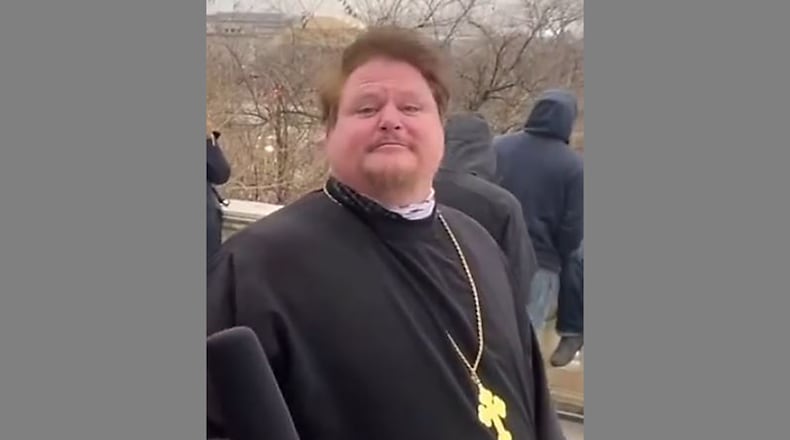“I disagree. I think it’s an unjust suspension,” Hodges told the Dayton Daily News this week.
Hodges, a Lima resident, said a three-month suspension was the direct result of his participation in the rally that saw the Capitol overrun by rioters attempting to halt a joint session of Congress from formally count Electoral College votes.
“My beloved bishop had questioned the wisdom of a priest attending,” he said. “I think part of the problem is I viewed that Stop the Steal rally as expressing extreme concern over voter fraud allegations in the 2020 election.”
Hodges said the call notifying him of the suspension came directly from Archbishop Paul Gassios, who leads the Diocese of the Midwest that includes 21 parishes in Ohio. Hodges said the archbishop could after three months extend the suspension, lift it or remove him from the priesthood.
A diocese spokesman declined to comment for this story.
Though attached to St. Paul the Apostle parish, Hodges has been a “supply” priest for the past couple of years, filling in at parishes in Byesville, Cleveland, Olmsted Falls and Toledo as well as at churches in Michigan when positions are empty or priests are on vacation, he said. Hodges previously served as the priest in charge at St. Stephen Orthodox Church in Lima.
Until this past Sunday, Hodges had not attended a service at St. Paul the Apostle in about a year, he said. The local church is at 4451 Wagner Road in Sugarcreek Twp.
Hodges said he did not go inside the Capitol building on Jan. 6, nor does he condone the violence that took place during the riot by supporters of former President Donald Trump.
“All I wanted to do was yell, ‘Stop the Steal!’ outside where Congress was meeting,” wrote Hodges to friends in an email message he shared with this newspaper.
In a Dec. 31 Facebook post, Hodges called on others to join the protest in Washington and be “on the front lines in the Second American Revolution, where you fought to save the Republic.”
The appearance in a video posted to social media of a man in an Orthodox cassock that turned out to be Hodges at the Capitol on Jan. 6 was relayed in a Jan. 9 letter to the diocese bishop by a church member. The letter was shared online publicly by the group Orthodoxy in Dialogue, which describes itself an independent Orthodox blog.
“Given that he promoted the start of the ‘Second American Revolution’ in his post, it is concerning to many lay people that a clergy in his position would have been present at an event that ultimately led to five people dying for no reason,” the letter read. Orthodoxy in Dialogue did not name the letter writer over safety concerns.
Hodges said he has been married for 38 years and has eight grown children and more than a dozen grandchildren.
In addition to its Ohio parishes, the Diocese of the Midwest includes churches in Illinois, Indiana, Iowa, Kansas, Michigan, Minnesota, Missouri, Nebraska, North Dakota and Wisconsin. The church’s American adherents numbered roughly 85,000 in more than 400 parishes, according to a 2010 U.S. Census study.
About the Author

